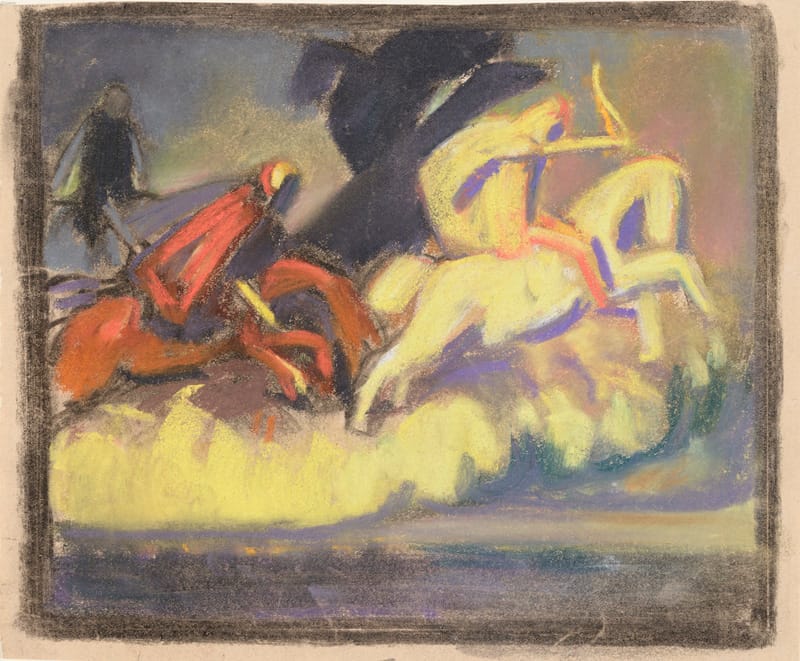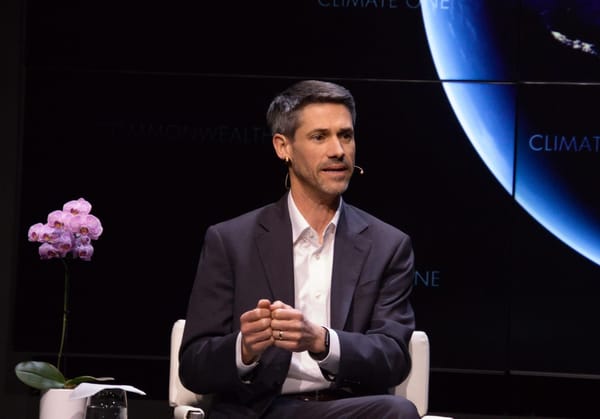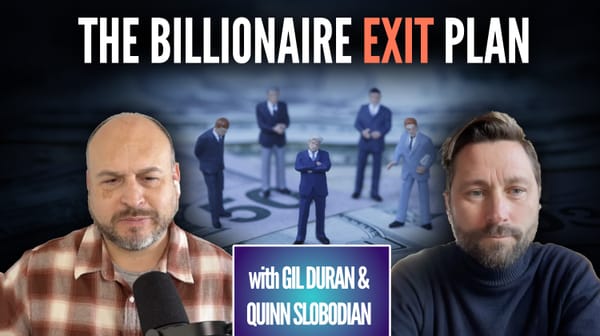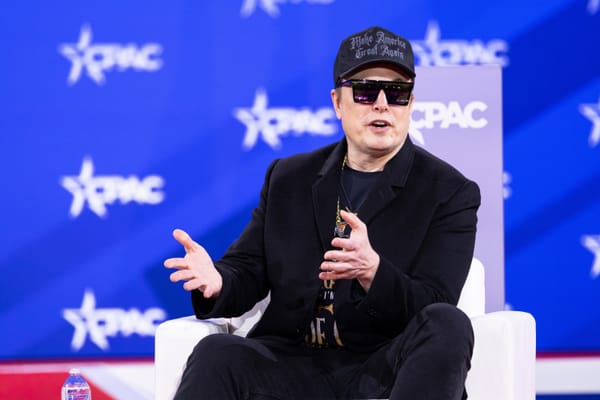Silicon Valley Apocalypse Capitalism
“Maybe if you aren’t trying to destroy the world, you’re not trying hard enough.”

Peter Thiel’s obsession with the Antichrist has transformed him from Silicon Valley’s so-called “philosopher-king” into a laughingstock. The Joe Rogan Experience and South Park have both roasted his bizarre biblical fixation, and critics have raised the obvious question of whether Thiel himself might be Satan’s earthly agent.
But the tech billionaire’s odd fascination is more than mere eccentricity. That’s because Thiel has a remarkable ability to convert laughable ideas into reality. In the late 1990s, he took an interest in the idea of “cyber currency” after reading about it in a book. His efforts to get ahead of the trend resulted in a company called PayPal. Thiel didn’t invent crypto, but PayPal made him rich, and disruptive digital fictions like Bitcoin arrived a decade later. Today, we even have a crypto billionaire president.
People Thiel has cultivated or mentored along the way—Elon Musk, Sam Altman, David Sacks—now hold tremendous influence and power. Thiel also spent years promoting an obscure blogger named Curtis Yarvin, who called for a dictator-like president to seize power and install a “CEO” to purge the federal bureaucracy through a process called RAGE—“Retire All Government Employees.”
These ideas, once dismissed as silly internet trolling, became government policy when President Trump appointed Musk to run a government-destroying project called DOGE. Vice President JD Vance—another Thiel protégé—openly cites Yarvin as a key influence.
The Power of ‘Hyperstition’
Silicon Valley has a word for Thiel’s unusual talent: “hyperstition.” The term, coined by “accelerationist” writer Nick Land, describes the belief that one can manifest future realities by telling compelling stories, and that prophecies become self-fulfilling through repetition and virality. Thiel dreamed a world of crypto and Yarvin, and today we live in it. Now he sees the Antichrist in his crystal ball, and we should consider his stubborn focus on this esoteric figure more horrifying than hilarious.
Throughout history, outbreaks of doomsday talk have sparked social upheaval, religious persecution, and violence. The pattern is so well documented that it even has its own academic field, eschatology, the study of religious “end times” beliefs.
Thiel fully understands the power of apocalyptic thinking. He roots his Antichrist sermons in the ideas of Carl Schmitt, a Nazi theorist who defined politics as a struggle against an existential enemy—a battle in which political actors manipulate religious symbols to seize power. Schmitt infamously provided legal justification for Hitler’s sweeping purges of political opponents and Jews.
Yet Thiel—with deep ties to intelligence agencies, law enforcement, and the White House—fuses Schmitt’s fascist philosophy with scripture to play DIY fire-and-brimstone prophet.
From Disruption to Doomsday
This religious-themed fervor is important because it reveals a deeper truth about the tech industry and the dark future it seems destined to manifest. Thiel is not the only tech figure preaching fantasies of doom.
Silicon Valley seems increasingly gripped by memes of existential dread. Having already materialized talking computers and self-driving cars of science fiction—and the digital surveillance architecture Orwell warned about in 1984—they have set their sights on even scarier new frontiers.
Artificial intelligence companies hype the coming of a “godlike” force capable of wiping out most jobs and, perhaps, all of humanity. Crypto companies peddle fantasies of digital salvation, shilling tokenized scams supposedly designed to survive the impending collapse of the U.S. dollar and the liberal democratic order. Elon Musk, declaring Earth obsolete, hallucinates a new promised land on the dead waste of Mars. New crops of startups promote delusional notions of eternal life while others launch the next generation of killer robot drones.
This is a dramatic break from the tech industry’s old marketing strategy, which sold its products as tools for connection, efficiency, and fun. Our sleek devices let us video chat with faraway loved ones, swipe on dates, and shop for every product on earth with a few taps on the touchscreen. In one of history’s greatest economic achievements, tech companies amassed trillions in value by getting us hooked. No one should be happier, or more optimistic, than the tech zillionaires who have won capitalism’s endgame and now enjoy unmatched power and privilege.
The Venture Capital Model’s Built-In Nihilism
Yet the lords of tech now find themselves haunted by visions of Armageddon. An industry that once promised flying cars and toil-free prosperity is now betting on brutal dystopia: mass surveillance, economic decline, autonomous weapons, and chatbots that talk children into suicide.
Thiel and his cohort of powerful industry leaders are done pretending. They’re hyping death, decline, and diabolical futures from which—in their self-serving gospel—only they can save us.
This frightening turn stems partly from the built-in existentialism of the venture capital model. Unlike traditional investors who seek long-term growth, VC thrives on high-risk bets and sudden windfalls born of accelerated disruption. Its mandate for perpetually exponential growth makes constant destruction the path to profit. The quickest way to scale a multibillion-dollar bonanza is to collapse existing systems—taxis, hotels, media—or escape into new ones: AI, Mars, digital immortality, “network states.”
The ending of worlds has become the business model.
To keep money flowing, investors pursue a mix of hype and hyperstition—the same reality-manufacturing logic at which Thiel so excels. Pitch decks turn existential threats—job-killing AI, Big Brother surveillance, democratic collapse—into thrilling financial opportunities. Incremental reform doesn’t make billion-dollar unicorns, but existential risk does. Rolling catastrophe becomes a feature, not a flaw. The biggest VC firms now have apocalypse hard-coded in their corporate DNA.
Tech’s New Prophets
Thiel’s doomsday creed has disciples. His supplicants and investors have begun to mimic his evangelical pose. Case in point: Katherine Boyle, a venture capitalist who started as an intern at Thiel’s Founders Fund. As a general partner at Andreessen Horowitz running the firm's “American Dynamism” fund—a portfolio betting billions on defense contractors, surveillance systems, and militarization—Boyle has become one of tech’s main proponents of “memetic warfare,” which is a fancy word for propaganda.
Speaking to the American Enterprise Institute in February, she declared: “We are living in an age of memetic power and memetic war. Meme it and we will be it.”
This is a pure specimen of hyperstitional thought, and Boyle also favors Thiel-style religious framing. In her February speech at AEI, she used the crucifixion of Jesus Christ to argue that “all of history is a war between the family and the state.” In August, she posted an image of St. Michael the Archangel and urged Christians to “fight evil.” After Charlie Kirk’s assassination, she proclaimed we're entering “an era of the martyr.” This is a very odd message coming from a multimillionaire VC whose business model requires a steady stream of military contracts.
Boyle exemplifies a new religious trend that centers tech founders as righteous figures on divine missions. Groups like the ACTS 17 Collective (“Acknowledging Christ in Technology and Society”)—which hosted Thiel’s San Francisco lectures—are recasting tech as a Christian crusade.
This goes beyond awkward rhetorical posturing. It’s hyperstition and memetic warfare as strategy, with tech figures weaponizing language to manufacture the very crises they claim are inevitable (while also positioning themselves as civilization’s saviors).
Ironically, Thiel claims the Antichrist is someone who “comes to power by talking constantly about Armageddon, about rumors of wars and scaring you into giving him control over science and technology.” The Antichrist, in Thiel’s telling, would rule through memes and hyperstition, turning prophecy into policy through fear.
This Antichrist dude sounds a lot like a venture capitalist.
“Maybe if you aren’t trying to destroy the world, you’re not trying hard enough,” declares Mike Solana, chief marketing officer at Founders Fund.
Why Silicon Valley Fears the Future
It makes sense that venture capitalists, viewing the world through this warped lens, would project their own angst onto society. And it’s logical that the religious paranoia of tech's high priests would peak as they align with Trump’s overtly fascist project.
Trump’s main Valley backers come mostly from the handful of interconnected VC firms that dominate the market. With him, they’re making their riskiest bet yet—staking their fortunes and reputations on his ability to permanently disrupt democracy. As his poll numbers drop and their do-or-die AI bubble weakens, anxiety and panic are natural side effects.
They’re right to fear the future. But there’s no reason for everyone else to ride shotgun on this messianic death trip. While most tech leaders have stayed disturbingly silent, Thiel’s Antichrist debacle offers a chance for saner voices to reject the theology of fear and outline a future beyond the authoritarian dystopia now on display.
Some are starting to break ranks. In October, Salesforce CEO Marc Benioff called on Trump to send troops into San Francisco. Ron Conway, the “Godfather of Silicon Valley,” publicly rebuked him and resigned from the Salesforce Foundation board. Benioff quickly apologized and rescinded his request.
This was modest moral pushback, but Silicon Valley needs more of it. Otherwise, it may get permanently branded as a world-destroying AI surveillance cult pushing fanaticism and fascism as system upgrades.
A reckoning
Thiel’s Antichrist lectures smear tech critics as potential Antichrists. However, it’s the tech billionaires who seem hellbent on optimizing for evil and pitching cataclysm as a profit source. This trend should be stigmatized and rejected, not celebrated or emulated. There's still time to exit this death cult’s road to techno-rapture.
Most people still find technology exciting and seductive. That will change once they see it as a tool for eliminating their jobs, harvesting their privacy, helping the government track and persecute their neighbors, and ending life as we know it.
Why support a company when its CEO’s commitment to democracy is even thinner than its latest phone? Who needs a flashy new computer when the literal apocalypse may be at hand? The doomed and paranoid worldview of tech’s radicalized apocalypse capitalists isn’t just bad for democracy—it’s bad for business.
Surely, Silicon Valley’s leaders can imagine possibilities more hopeful than demons, dictators, and damnation. If so, now’s the time to pitch them.
This paywall-free newsletter, which takes on dangerous and powerful billionaires, is made possible by 800 paid subscribers. If you can, please become a paid subscriber to ensure this work continues. Click here to join us.





